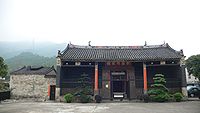
Ancestral hall
Encyclopedia

Ancestor Veneration in China
Ancestral veneration in Chinese culture is the practice of living family members who try to provide a deceased family member with continuous happiness and well-being in the afterlife. It is a way of continuing to show respect towards them, and it reinforces the unity of family and lineage. Showing...
in Chinese culture. Ancestral halls are closely linked to Confucian
Confucianism
Confucianism is a Chinese ethical and philosophical system developed from the teachings of the Chinese philosopher Confucius . Confucianism originated as an "ethical-sociopolitical teaching" during the Spring and Autumn Period, but later developed metaphysical and cosmological elements in the Han...
culture and the emphasis that it places on filial piety
Filial piety
In Confucian ideals, filial piety is one of the virtues to be held above all else: a respect for the parents and ancestors. The Confucian classic Xiao Jing or Classic of Xiào, thought to be written around 470 BCE, has historically been the authoritative source on the Confucian tenet of xiào /...
.
A common central feature of the ancestral halls are the ancestral tablets
Spirit tablet
A spirit tablet or ancestral tablet is a placard used to designate the seat of a deity or past ancestor as well as to enclose it. With origins in traditional Chinese culture, the spirit tablet is a common sight in many East Asian countries where any form of ancestor veneration is practiced...
that embody the ancestral spirits. The ancestral tablets are typically arranged by seniority of the ancestors. Altars and other ritual objects such as incense burners are also common fixtures.
The halls are used for collective rituals and festivals in honor of the ancestors but also for other family- and community-related functions such as weddings and funerals. Sometimes, they serve wider community functions such as meetings and local elections.
Ancestral halls have often been secularized to serve as village schools or granaries during the land reform of the 1950s and the Cultural Revolution
Cultural Revolution
The Great Proletarian Cultural Revolution, commonly known as the Cultural Revolution , was a socio-political movement that took place in the People's Republic of China from 1966 through 1976...
. They have experienced a revival since the economic liberalization
Chinese economic reform
The Chinese economic reform refers to the program of economic reforms called "Socialism with Chinese characteristics" in the People's Republic of China that were started in December 1978 by reformists within the Communist Party of China led by Deng Xiaoping.China had one of the world's largest...
of the 1980s. The revival of the ancestral halls has been particularly strong in southern China where lineage organization had stronger roots in the local culture and local communities are more likely to have members living overseas who can support rebuilding of the halls
through donations.

